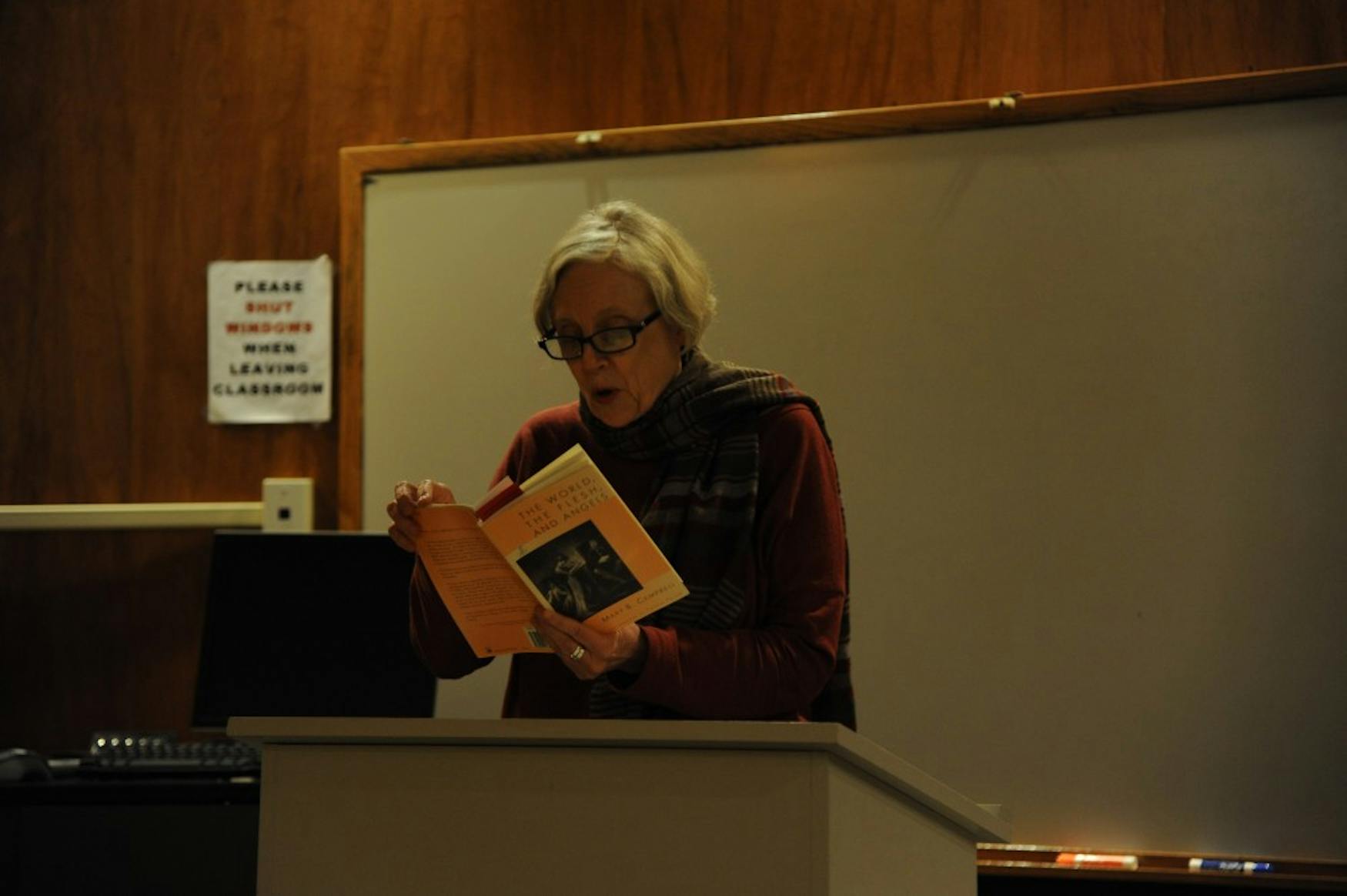English professors recite their own poetry
In her introduction before Thursday’s poetry reading, Prof. Elizabeth Bradfield (ENG), Jacob Ziskind Visiting Poet-in-Residence, noted that there is something special about hearing one’s own professors present their original artistic work. Some 30 students had this opportunity last Thursday at Profs. Sharon Bryan (ENG) and Mary Baine Campbell’s (ENG) poetry reading in Pearlman Hall.
The students, along with staff members and guests, gathered to listen to Bryan and Campbell read poetry from their books Sharp Stars and Trouble, respectively. Pearlman’s unique circular shape and fireside setting created an intimate environment for the poets to discuss a range of topics, including the origin of the universe, the meaning of words, and more contemporary issues like freedom of speech and climate change.
The first poem Bryan read was “Big Band Theory,” which was inspired by an NPR segment about the Big Bang theory that Bryan initially misheard. The poem examined the origin of music and humans’ desire to be in motion.
Sharon’s next two poems, “Saying Things” and “Bass Bass,” questioned how words earn their meanings and how these meanings can affect people’s lives.
Sharon commented that she did not know how to say the title of her second poem, “Bass Bass,” and that this uncertainly played into the poem’s theme of failed articulation. “Bass Bass” stated that “if you fail to enunciate, you could live your life all wrong.” The poem interpreted the statement literally; in Bryan’s poem, God failed to enunciate and was thus misquoted, drastically changing the meaning of several biblical verses. For instance, “Bass Bass” featured the line, “God looked at what he had made, and saw that it was food” in a jumbled version of the original quotation from Genesis 1:31.
Continuing with the biblical theme, the next poem was “Flood,” which retold the story of Noah and the Ark. An annoying dog inspired “Barking Dog,” about a particularly loud dog in Frezno intruding on Bryan’s headspace.
Bryan’s final few poems were “Stardust,” “Glenn Gould Humming,” and “Oh Boy.” An exhibit about the universe at the Rose Center for Earth and Space in New York inspired “Stardust.” Whereas the exhibit sought to quantify the universe’s history, the poem aimed to quantify humans’ experience within the timeframe of the earth’s existence. “Glenn Gould Humming” was written in sonnet form, a format Bryan had not used since high school. “Oh Boy” used the Shakers, a religious sect, as a lens through which to examine music and human interaction.
Campbell’s first two poems, “Precipitation” and “WARNING: NUCLEAR WASTE DUMP” addressed the theme of climate change. Campbell is a member of the group Faculty Action on Climate Change, and her passion for the topic was clearly displayed in her poems. “Precipitation” talked about different objects falling from the sky while “WARNING: NUCLEAR WASTE DUMP” addressed the issue of signage at nuclear waste dumps. Campbell explained that she had heard that, hypothetically, warning signs at these dumps must be able to be understood for ages due to Uranium’s extremely long half-life period. In her poem, she attempted to articulate one such warning sign that could be used in this situation.
Campbell’s next few poems, “Sand Castle,” “Descartes was a Soldier” and “Descartes Gets Cold” were inspired by her time in France and by the French philosopher Descartes. “Sand Castle” talks about a time when Campbell sat across from where Marie Antoinette’s house once stood and remarked that the building in that space looked like a sand castle. The two poems about Descartes discussed his choice to go to war and his death from pneumonia after a life-long aversion to the cold.
Campbell read “Overcome,” a reference to the protest song “We Shall Overcome,” in response to the Justice’s recent editorial on free speech. Campbell remarked that despite the lack of contract terminations, she felt that the atmosphere of censorship on campus—an atmosphere to which she feels the editorial contributed—will be challenging to overcome.
“Hearing” was a poem inspired by the 1992 Los Angeles riots, which were a series of demonstrations in response to a case of police brutality. The poem takes its title from the saying that riots are the language of the unheard.
The next two poems, “We Are Devo” and “I Didn’t Do It,” touched on very different topics. “We Are Devo” was about a coelacanth, the oldest species of fish, and the poem belonged to a series of writings about personified animals. “I Didn’t Do It” followed a woman who refused to get married.
Campbell ended her reading with a love poem, “Alpha and Omega.”
The reading’s intimate setting and its wide range of topics helped the professors connect with the audience, and the poems ended the reading to the sound of applause from their peers and students alike.



Please note All comments are eligible for publication in The Justice.